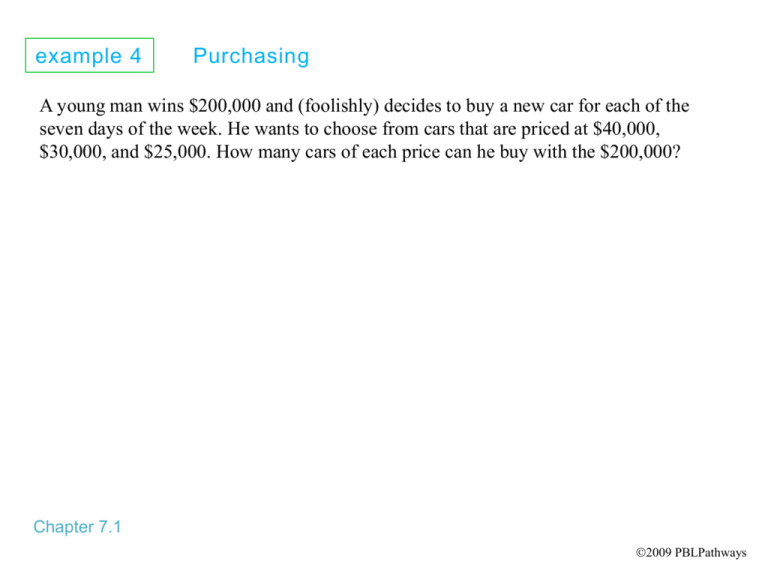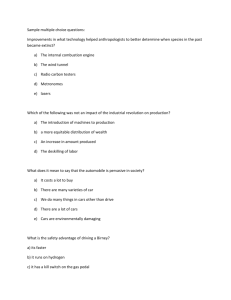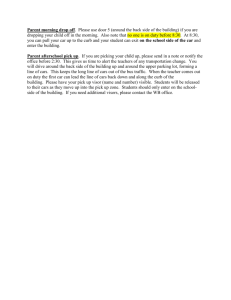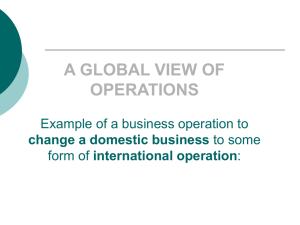Slide 1 - PBL Pathways
advertisement

example 4 Purchasing A young man wins $200,000 and (foolishly) decides to buy a new car for each of the seven days of the week. He wants to choose from cars that are priced at $40,000, $30,000, and $25,000. How many cars of each price can he buy with the $200,000? Chapter 7.1 2009 PBLPathways A young man wins $200,000 and (foolishly) decides to buy a new car for each of the seven days of the week. He wants to choose from cars that are priced at $40,000, $30,000, and $25,000. How many cars of each price can he buy with the $200,000? 2009 PBLPathways A young man wins $200,000 and (foolishly) decides to buy a new car for each of the seven days of the week. He wants to choose from cars that are priced at $40,000, $30,000, and $25,000. How many cars of each price can he buy with the $200,000? 2009 PBLPathways A young man wins $200,000 and (foolishly) decides to buy a new car for each of the seven days of the week. He wants to choose from cars that are priced at $40,000, $30,000, and $25,000. How many cars of each price can he buy with the $200,000? x: number of cars costing $40,000 y: number of cars costing $30,000 z: number of cars costing $25,000 Total x Number y of Carsz 7 Total Amount Spendz 200,000 40,000 x 30,000 y to25,000 2009 PBLPathways A young man wins $200,000 and (foolishly) decides to buy a new car for each of the seven days of the week. He wants to choose from cars that are priced at $40,000, $30,000, and $25,000. How many cars of each price can he buy with the $200,000? x: number of cars costing $40,000 y: number of cars costing $30,000 z: number of cars costing $25,000 Total x Number y of Carsz 7 Total Amount Spendz 200,000 40,000 x 30,000 y to25,000 2009 PBLPathways A young man wins $200,000 and (foolishly) decides to buy a new car for each of the seven days of the week. He wants to choose from cars that are priced at $40,000, $30,000, and $25,000. How many cars of each price can he buy with the $200,000? x: number of cars costing $40,000 y: number of cars costing $30,000 z: number of cars costing $25,000 Total x Number y of Carsz 7 Total Amount Spendz 200,000 40,000 x 30,000 y to25,000 2009 PBLPathways A young man wins $200,000 and (foolishly) decides to buy a new car for each of the seven days of the week. He wants to choose from cars that are priced at $40,000, $30,000, and $25,000. How many cars of each price can he buy with the $200,000? x: number of cars costing $40,000 y: number of cars costing $30,000 z: number of cars costing $25,000 Total x Number y of Carsz 7 Total Amount Spendz 200,000 40,000 x 30,000 y to25,000 2009 PBLPathways A young man wins $200,000 and (foolishly) decides to buy a new car for each of the seven days of the week. He wants to choose from cars that are priced at $40,000, $30,000, and $25,000. How many cars of each price can he buy with the $200,000? x: number of cars costing $40,000 y: number of cars costing $30,000 z: number of cars costing $25,000 Total x Number y of Carsz 7 Total Amount Spendz 200,000 40,000 x 30,000 y to25,000 2009 PBLPathways A young man wins $200,000 and (foolishly) decides to buy a new car for each of the seven days of the week. He wants to choose from cars that are priced at $40,000, $30,000, and $25,000. How many cars of each price can he buy with the $200,000? x: number of cars costing $40,000 y: number of cars costing $30,000 z: number of cars costing $25,000 Total x Number y of Carsz 7 Total Amount Spendz 200,000 40,000 x 30,000 y to25,000 2009 PBLPathways A young man wins $200,000 and (foolishly) decides to buy a new car for each of the seven days of the week. He wants to choose from cars that are priced at $40,000, $30,000, and $25,000. How many cars of each price can he buy with the $200,000? x: number of cars costing $40,000 y: number of cars costing $30,000 z: number of cars costing $25,000 Total x Number y of Carsz 7 Total Amount Spendz 200,000 40,000 x 30,000 y to25,000 2009 PBLPathways A young man wins $200,000 and (foolishly) decides to buy a new car for each of the seven days of the week. He wants to choose from cars that are priced at $40,000, $30,000, and $25,000. How many cars of each price can he buy with the $200,000? x: number of cars costing $40,000 y: number of cars costing $30,000 z: number of cars costing $25,000 x y z 7 Total Amount Spendz 200,000 40,000 x 30,000 y to25,000 2009 PBLPathways A young man wins $200,000 and (foolishly) decides to buy a new car for each of the seven days of the week. He wants to choose from cars that are priced at $40,000, $30,000, and $25,000. How many cars of each price can he buy with the $200,000? x: number of cars costing $40,000 y: number of cars costing $30,000 z: number of cars costing $25,000 x y z 7 40,000 x 30,000 y 25,000 z 200,000 2009 PBLPathways x y z 7 40,000 x 30,000 y 25,000 z 200,000 -40,000 E1 + E2 E2 x y z 7 10,000 y 15,000 z 80,000 1 10,000 E1 + E2 E2 x y z7 y 1.5 z 8 2009 PBLPathways x y z 7 40,000 x 30,000 y 25,000 z 200,000 -40,000 E1 + E2 E2 x y z 7 10,000 y 15,000 z 80,000 1 10,000 E1 + E2 E2 x y z7 y 1.5 z 8 2009 PBLPathways x y z 7 40,000 x 30,000 y 25,000 z 200,000 -40,000 E1 + E2 E2 x y z 7 10,000 y 15,000 z 80,000 1 10,000 E1 + E2 E2 x y z7 y 1.5 z 8 2009 PBLPathways x y z 7 40,000 x 30,000 y 25,000 z 200,000 -40,000 E1 + E2 E2 x y z 7 10,000 y 15,000 z 80,000 1 10,000 E1 + E2 E2 x y z7 y 1.5 z 8 2009 PBLPathways x y z 7 40,000 x 30,000 y 25,000 z 200,000 -40,000 E1 + E2 E2 x y z 7 10,000 y 15,000 z 80,000 1 10,000 E2 E2 x y z7 y 1.5 z 8 2009 PBLPathways x y z 7 40,000 x 30,000 y 25,000 z 200,000 -40,000 E1 + E2 E2 x y z 7 10,000 y 15,000 z 80,000 1 10,000 E2 E2 x y z7 y 1.5 z 8 2009 PBLPathways A young man wins $200,000 and (foolishly) decides to buy a new car for each of the seven days of the week. He wants to choose from cars that are priced at $40,000, $30,000, and $25,000. How many cars of each price can he buy with the $200,000? x: number of cars costing $40,000 y: number of cars costing $30,000 z: number of cars costing $25,000 x y z 7 40,000 x 30,000 y 25,000 z 200,000 Echelon Form x y z7 y 1.5 z 8 2009 PBLPathways A young man wins $200,000 and (foolishly) decides to buy a new car for each of the seven days of the week. He wants to choose from cars that are priced at $40,000, $30,000, and $25,000. How many cars of each price can he buy with the $200,000? x: number of cars costing $40,000 y: number of cars costing $30,000 z: number of cars costing $25,000 x y z 7 40,000 x 30,000 y 25,000 z 200,000 Echelon Form y 8 1.5 z x7 yz 7 8 1.5 z z x y z7 y 1.5 z 8 1 0.5 z 2009 PBLPathways A young man wins $200,000 and (foolishly) decides to buy a new car for each of the seven days of the week. He wants to choose from cars that are priced at $40,000, $30,000, and $25,000. How many cars of each price can he buy with the $200,000? x: number of cars costing $40,000 y: number of cars costing $30,000 z: number of cars costing $25,000 x y z 7 40,000 x 30,000 y 25,000 z 200,000 Echelon Form y 8 1.5 z x7 yz 7 8 1.5 z z x y z7 y 1.5 z 8 1 0.5 z 2009 PBLPathways A young man wins $200,000 and (foolishly) decides to buy a new car for each of the seven days of the week. He wants to choose from cars that are priced at $40,000, $30,000, and $25,000. How many cars of each price can he buy with the $200,000? x: number of cars costing $40,000 y: number of cars costing $30,000 z: number of cars costing $25,000 x y z 7 40,000 x 30,000 y 25,000 z 200,000 Echelon Form y 8 1.5 z x7 yz 7 8 1.5 z z x y z7 y 1.5 z 8 1 0.5 z 2009 PBLPathways A young man wins $200,000 and (foolishly) decides to buy a new car for each of the seven days of the week. He wants to choose from cars that are priced at $40,000, $30,000, and $25,000. How many cars of each price can he buy with the $200,000? x: number of cars costing $40,000 y: number of cars costing $30,000 z: number of cars costing $25,000 x y z 7 40,000 x 30,000 y 25,000 z 200,000 Solution x 1 0.5 z y 8 1.5 z 2009 PBLPathways A young man wins $200,000 and (foolishly) decides to buy a new car for each of the seven days of the week. He wants to choose from cars that are priced at $40,000, $30,000, and $25,000. How many cars of each price can he buy with the $200,000? x: number of cars costing $40,000 y: number of cars costing $30,000 z: number of cars costing $25,000 z x y 0 -1 8 1 -0.5 6.5 2 0 5 3 0.5 3.5 4 1 2 5 1.5 0.5 6 2 -1 7 2.5 -2.5 x y z 7 40,000 x 30,000 y 25,000 z 200,000 Solution x 1 0.5 z y 8 1.5 z 2009 PBLPathways A young man wins $200,000 and (foolishly) decides to buy a new car for each of the seven days of the week. He wants to choose from cars that are priced at $40,000, $30,000, and $25,000. How many cars of each price can he buy with the $200,000? x: number of cars costing $40,000 y: number of cars costing $30,000 z: number of cars costing $25,000 z x y 0 -1 8 1 -0.5 6.5 2 0 5 3 0.5 3.5 4 1 2 5 1.5 0.5 6 2 -1 7 2.5 -2.5 x y z 7 40,000 x 30,000 y 25,000 z 200,000 Solution x 1 0.5 z y 8 1.5 z 2009 PBLPathways





